The bow rests on the cello and a deep, poignant note solitarily fills the silence.
It’s just an instant. Two violins and one viola join the melody and make Villa Firenze the evocative setting of a lyrical moment that the audience will hardly forget.
We are listening to “Crisantemi” (Chrysanthemums, a flower that symbolizes death in Italy), the sonata for string quartet that Giacomo Puccini wrote on impulse in a single night to commemorate Amedeo of Savoy who had died on that very day.
With religious silence, the audience and I participate in the magic that the four magnificent performers of the National Symphony Orchestra are creating for us.
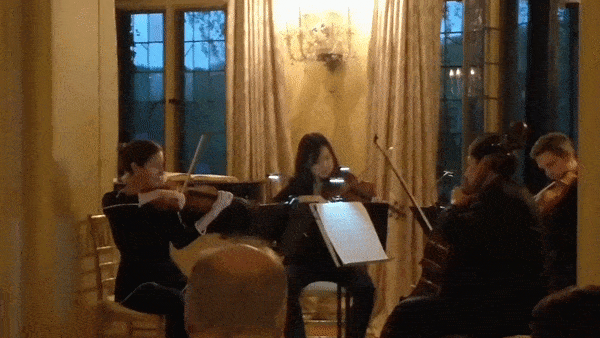
One minute earlier, an exceptional figure had introduced the four young artists and prepared us for the experience.
“You probably never expected Puccini to have composed pieces for string quartet,… but he did.” told us Gianandrea Noseda, one of the great contemporary orchestra conductors, director of the National Symphony Orchestra di Washington and a great Italian.
The Event
We were invited to Villa Firenze, the residence of the Italian Ambassador in Washington, for the presentation of Unexpected Italy, a series of concerts and events that show the breadth and depth of Italian contributions to world art and culture.
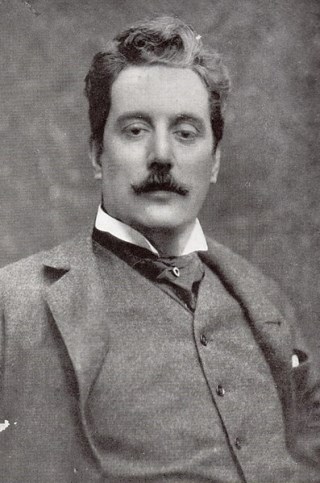
Puccini’s sonata and the Intermezzo della Cavalleria Rusticana that followed were meant to whet the appetite for the musical events that will take place in May at the John F. Kennedy Center for the Performing Arts. In addition to the Washington dates, the National Symphony Orchestra (NSO) will perform at the Carnegie Hall in New York.
Noseda also spoke about other cultural initiatives in Washington that directly concern Italy. Tintoretto at the National Gallery, as well as a musical program that includes Rossini and Franz Liszt. The latter is relevant to Italy for having written the Dante-Symphony, a symphony inspired by the Divine Comedy of the supreme poet. Alfredo Casella and Ottorino Respighi will also be an integral part of the proposed program for Unexpected Italy.
Before Noseda took the stage, Deborah Rutter, President of the Kennedy Center, and Italian Ambassador, Armando Varricchio, also did.
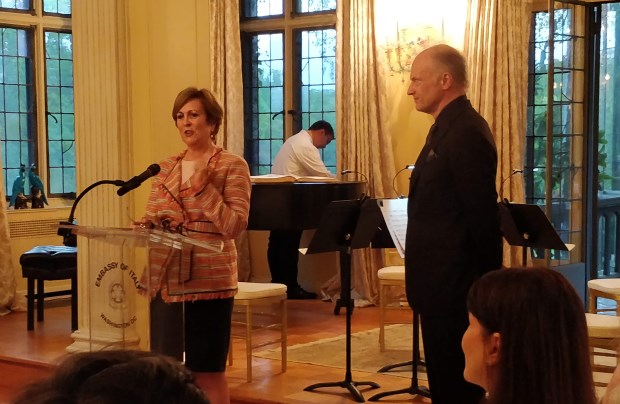
Ms. Rutter talked about Villa Firenze, this beautiful home which is a great venue to celebrate “the Italy you don’t expect”.
“It was when we came to lunch here, with you Ambassador and your wife, to talk about the ideas of Maestro Noseda, that we were able to bring together all the pieces of a wonderful project”
But Unexpected Italy will not be limited to classical music and Opera. Deborah also explained that Italian jazz and dance will be integral parts of the program.
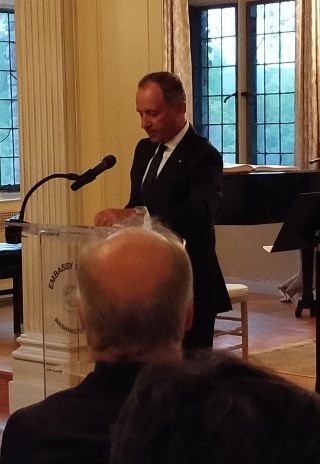
Before Ms. Rutter, Ambassador Varricchio did the honors, presenting the protagonists of Unexpected Italy and explaining the genesis of a project that will promote the Italian cultural heritage.
“As Italians, we have the privilege to call home a country whose cultural heritage gives a beautiful display of itself in all international events. I am convinced that it is this cultural heritage, and the respect for it, that gives Italians the extra edge in exploring what is new and unexpected in art. You will see all this reflected in the program that Deborah and Gianandrea put together.”
Varricchio also dedicated a few words to the long list of “Italian” initiatives that will enrich Washington’s cultural landscape in the spring of 2019.
A Chat with Maestro Noseda
After the concert, I had the opportunity to talk to Maestro Noseda and he, being the kind and gracious person that he is, lent himself to our dialogue.
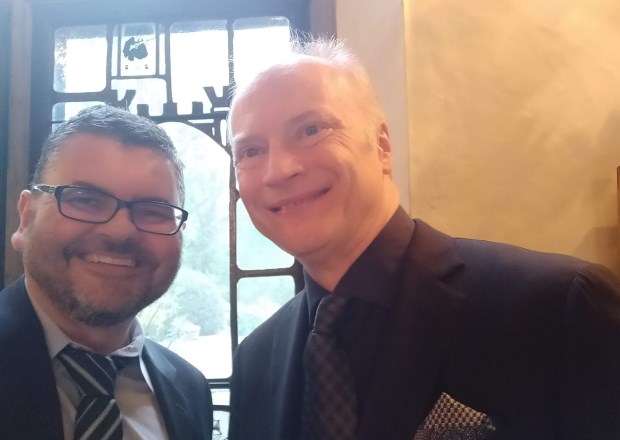
VNY: As an Italian, I know Opera by osmosis, at least as far as the main operas go. This is knowledge that I try to convey to my son, who, growing up in America, often has hard questions for me…. Many perceive Opera as “art of the past”. Nowadays Opera no longer exists, unless we accept Broadway musicals as its modern version. So why doesn’t Italy play a leading role in modern Opera?
GN: Modern operas are still composed by living Italian composers, and are staged in large theaters, both in the USA, at the Metropolitan, and in Italy. I myself directed a world premiere in 2011. Among modern composers I’ll mention Battistelli who wrote the Richard III.
Of course, the golden age of the Opera is clearly the nineteenth century. However, just as we look at a Tintoretto painting or one by Titian, and from this we draw references to judge contemporary art, so the nineteenth-century Opera still gives us those elements to appreciate a Broadway musical or any other kind of popular music theater.
Staying connected to our past is key.
VNY: As a born and raised Italian, what you just explained makes total sense. We Europeans, particularly we Italians, have internalized the concept that we are the result of everything that happened before us. Yet, one thing that I learned the hard way is the perception of how Americans feel about this: Past is okay, but there may be a present that does not necessarily have to take on all that has happened in the past. This is understandable in a country whose cultural roots are certainly in Europe, but now also Asia, India, China, Japan…. The country does not want to endorse European cultures exclusively. Coming to the question, can there be an Italian way of being a protagonist in the globalized world?
GN: I think so. Italy is a winner when it comes to its great qualities: Food and wine, design, music, art, our great fathers, and also a certain savoir-vivre. I am also aware of where the world is going, but I think it is very dangerous not to recognize the past. Forgetting the past could see us repeat the same mistakes. The present without historical knowledge is like a tree detached from its roots. Those who don’t know the past cannot possibly be ready for the future.
VNY: Is it a reference to politics?
GN: No. It is a reference to historical memory. The lack of historical memory leads to making mistakes. The problem is that we have not learned the lesson yet.
VNY: We Italians or we humanity?
GN: We humanity. We risk losing our memory.
VNY: How do you like being in America?
GN: I really like it because, besides being Italian, I am also extremely curious to learn about all the other realities.
About Unexpected Italy
The program of “Unexpected Italy: a celebration of Italian culture” is available at:












